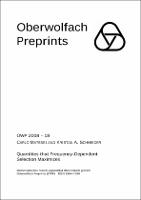| dc.contributor.author | Matessi, Carlo | |
| dc.contributor.author | Schneider, Kristian | |
| dc.date.accessioned | 2008-03-20T12:00:23Z | |
| dc.date.accessioned | 2016-10-05T14:14:09Z | |
| dc.date.available | 2008-03-20T12:00:23Z | |
| dc.date.available | 2016-10-05T14:14:09Z | |
| dc.date.issued | 2008-03-18 | |
| dc.identifier.uri | http://publications.mfo.de/handle/mfo/1135 | |
| dc.description | Research in Pairs 2008 | en_US |
| dc.description.abstract | We consider a model of frequency-dependent selection, to which we refer as the Wildcard Model, that accommodates as particular cases a number of diverse models of biologically specific situations. Two very different particular models (Lessard, 1984; Bürger, 2005; Schneider, 2006), subsumed by the Wildcard Model, have been shown in the past to have a Lyapunov functions (LF) under appropriate genetic assumptions. We show that the Wildcard Model: (i) in continuous time is a generalized gradient system for one locus, multiple alleles and for multiple loci, assuming linkage equilibrium, and its potential is a Lyapunov function; (ii) the LF of the particular models are special cases of the Wildcard Model's LF; (iii) the LF of the Wildcard Model can be derived from a LF previously identified for a model of density- and frequency- dependent selection due to Lotka-Volterra competition, with one locus, multiple alleles, multiple species and continuous-time dynamics (Matessi and Jayakar, 1981). We extend the LF with density and frequency dependence to a multilocus, linkage equilibrium dynamics. | en_US |
| dc.language.iso | en | en_US |
| dc.publisher | Mathematisches Forschungsinstitut Oberwolfach | en_US |
| dc.relation.ispartofseries | Oberwolfach Preprints;2008,18 | |
| dc.title | Quantities that frequency-dependent selection maximizes | en_US |
| dc.type | Preprint | en_US |
| dc.rights.license | Dieses Dokument darf im Rahmen von § 53 UrhG zum eigenen Gebrauch kostenfrei heruntergeladen, gelesen, gespeichert und ausgedruckt, aber nicht im Internet bereitgestellt oder an Außenstehende weitergegeben werden. | de |
| dc.rights.license | This document may be downloaded, read, stored and printed for your own use within the limits of § 53 UrhG but it may not be distributed via the internet or passed on to external parties. | en |
| dc.identifier.doi | 10.14760/OWP-2008-18 | |
| local.scientificprogram | Research in Pairs 2008 | |
| local.series.id | OWP-2008-18 | |
| dc.identifier.urn | urn:nbn:de:101:1-2008121515 | |
| dc.identifier.ppn | 164951168X | |

